Hanoi (VNA) – Vietnam’s gold market is poised for significant reform as eligible banks and enterprises will soon be permitted to import raw gold and produce bullion — a move expected to invigorate the sector with increased competition and more brands.
Dao Xuan Tuan, Director of the Foreign Exchange Management Department at the State Bank of Vietnam (SBV), told the Lao dong (Labour) daily that the SBV is in the process of finalising a draft Government decree that amends Decree 24/2012/ND-CP, aimed at gradually liberalising the gold bullion market while ensuring stringent regulatory oversight.
A key proposal in the draft is to allow eligible banks and enterprises to import raw gold and produce bullion — a function that, until now, has been exclusively assigned to a single entity.
The SBV will issue licences to the credit institutions and enterprises meeting requirements to import raw gold to produce bullion, or use the imported material to produce jewellery, Tuan was quoted by the newspaper.
Material import quotas will be granted basing on macroeconomic conditions, the monetary policy, and market fluctuations. This new approach is intended to dismantle the existing monopoly while maintaining the State’s regulatory and supervisory role.
Under the proposed regulations, licensed bullion producers must publicly declare quality standards, maintain detailed transaction records, and integrate their data systems with those of regulatory authorities.
Tuan emphasised that enterprises will be held accountable if product quality does not match the declared standards, adding that data about bullion transactions must be transparent as they are subject to audit at any time.
The permission of multiple bullion brands is hoped to create a more competitive marketplace, narrow price differentials between brands, and ultimately benefit consumers.
To further enhance market transparency and oversight, all payments for bullion transactions will be required to be made via bank accounts and accompanied by electronic invoices — a measure aimed at improving financial tracking and control.
Regarding the jewellery gold sector, Tuan noted that while over 6,000 enterprises are currently active in the production and trading of jewellery gold, most are small-scaled businesses lacking the financial capacity to obtain import licences.
To address this, the draft decree stipulates that only credit institutions and bullion producers eligible to produce gold bullion are licensed to import raw gold. These entities may then supply raw materials to domestic jewellery manufacturers.
This regulation will both increase the supply of raw gold and ensure that import activities remain under control, he noted.
Licensed importers will also be required to establish transparent internal processes, keep full transaction records, and connect their information systems with the relevant authorities to support inspection and monitoring.
The revised decree is expected to represent a turning point for Vietnam’s gold market, laying a stepping stone for a more competitive and transparent market operating in line with market changes and the law./.

See more

Da Nang continues targeted investment promotion approaches
According to Chairman of the Da Nang People’s Committee Pham Duc An, the city prioritises building sustainable economic ecosystems and focuses on key breakthrough sectors with strong spillover effects, including high technology and digital transformation, logistics, urban infrastructure, finance, processing and manufacturing industries, high-tech agriculture, and the pharmaceutical and medicinal herb industry.

📝OP-ED: Resolution 79 – Launchpad for national aspirations
Resolution 79 is not only about SOEs. At a deeper level, it is about how Vietnam reorganises its development drivers in a world that is changing at breakneck speed.
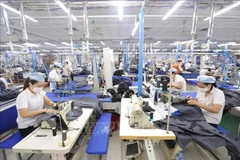
UOB raises Vietnam’s 2026 GDP growth forecast to 7.5%
In 2025, Vietnam’s GDP grew by 8%, beating UOB’s forecast of 7.7% but still falling short of the Government’s target of 8.3–8.5%, which would have needed an extraordinary boost in the final quarter.
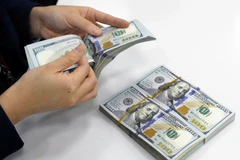
Reference exchange rate up 4 VND on January 10
With the current trading band of +/- 5%, the ceiling rate applicable for commercial banks during the day is 26,388 VND/USD, and the floor rate 23,874 VND/USD.

Infrastructure key to unlocking tourism’s role in double-digit growth target
With transport links running smoothly, urban infrastructure upgraded and digital platforms built out in a more systematic way, tourism would move beyond a purely consumption-driven sector to become a deeper, more durable engine of growth.

Hyundai sales in Vietnam rise almost 23% in December
In 2025, sales reached 53,229 vehicles across the market, a result considered a testament to the efforts by TC Group, Hyundai Thanh Cong, and the entire Hyundai dealership network nationwide amidst a volatile market.

Da Nang approves plan key infrastructure developers at FTZ
The Da Nang FTZ is expected to contribute 17.9% to the city’s gross regional domestic product and create 127,000 jobs by 2040, with total investment needs estimated at 40 trillion VND (1.6 billion USD).

HCM City accelerates shift toward ecological urban agriculture
The city’s agricultural sector is undergoing a strong transformation, restructuring toward higher value-added and sustainable development. In recent years, the sector has maintained steady growth, with agricultural, forestry and fisheries output rising by an estimated 2.5% annually.
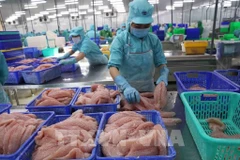
Vietnam records biggest trade surplus with Netherlands among European partners
Vietnam’s exports to the Netherlands totalled 13.5 billion USD last year, up 3.7% compared to 2024, while imports stood at 825 million USD, rising 5.2%.
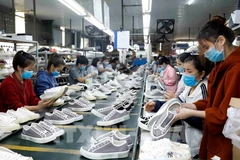
Footwear-leather industry seeks new drivers to sustain growth
Vietnam currently ranks third globally in footwear production, with around 1.4 billion pairs manufactured annually, behind China and India, and second in exports with approximately 1.3 billion pairs a year.

Sunpro - Ben Tre wind power plant becomes operational in Vinh Long
The plant features seven turbines and has a total investment of about 1.6 trillion VND (60.9 million USD), expected to generate 89.5 GWh per year, enough to supply electricity for about 27,000 households.

Dong Nai to launch major projects ahead of 14th National Party Congress
The launch of work on these projects represents an important political event for the province as they demonstrate the strong commitment of the entire political system to developing a comprehensive and modern infrastructure network, enhancing inter-regional connectivity, and addressing social welfare needs.
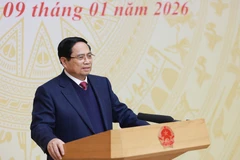
PM orders sharp cut in State-funded projects, caps 2026–2030 total at 3,000
For 2026, the Government has allocated nearly 995.35 trillion VND in state budget investment, with about 85.6% already assigned as of January 7.
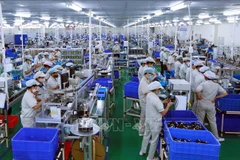
Lam Dong ready for nationwide economic census 2026
The entire process needs to reassure respondents that statistical activities operate independently, information is protected under the Statistics Law, and all data collection is completely separate from tax management.

Prudential plc CEO reinforces long-term commitment to Vietnam during market visit
Prudential has been operating in Vietnam for more than 26 years, having been the first foreign insurer to establish a representative office in the country in 1999.
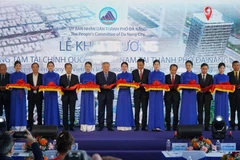
Vietnam launches International Financial Centre in Da Nang
The Government has clearly defined the development orientation of the International Financial Centre in Da Nang as a modern international financial hub closely linked with the innovation ecosystem, digital technology, and sustainable finance.
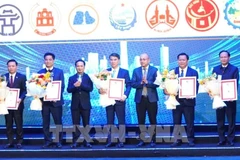
Tay Ninh named among top 10 most attractive localities for large enterprises for second consecutive year
In 2025, Tay Ninh’s economy maintained strong growth momentum, with gross regional domestic product (GRDP) expanding by 9.52%, ranking eighth among 34 provinces and cities nationwide.

Lam Dong steps up oversight to curb IUU fishing
As of early January 2026, the province had 8,210 registered fishing vessels, with more than 90% holding valid fishing licences, according to the department. A total of 8,115 vessels, or 98.76%, have been updated in the National Population Database, while 1,773 out of 1,941 vessels measuring 15 metres or longer have been granted food safety certificates, accounting for 91.34%.

People’s legitimate rights, interests must never be overlooked in public investment: PM
The Prime Minister underlined that public investment has consistently been identified as a key political task, with public investment disbursement results serving as one of the criteria for evaluating officials under Party regulations. Through state spending, public investment directly boosts aggregate demand and serves as an effective tool for regulating and stabilising the macroeconomy while safeguarding major economic balances.
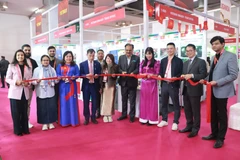
Vietnamese agricultural, food products draw attention at Asia’s leading tradeshow
For Vietnamese companies, Indusfood 2026 offers direct access to global buyers, opportunities to connect with distribution partners, insights into emerging consumer trends, and engagement in thematic events on investment, logistics, digital transformation, artificial intelligence and innovation in the food industry.







